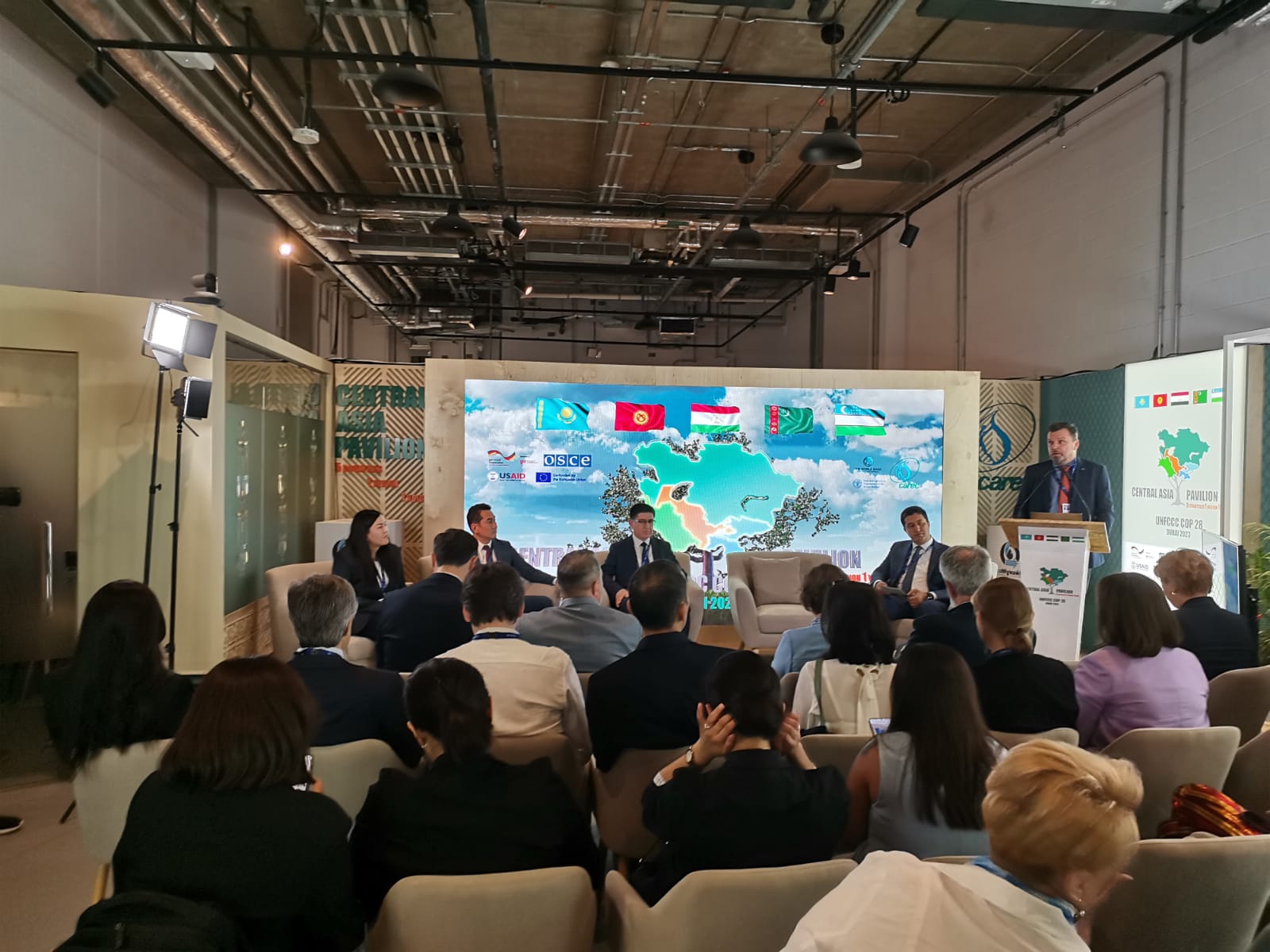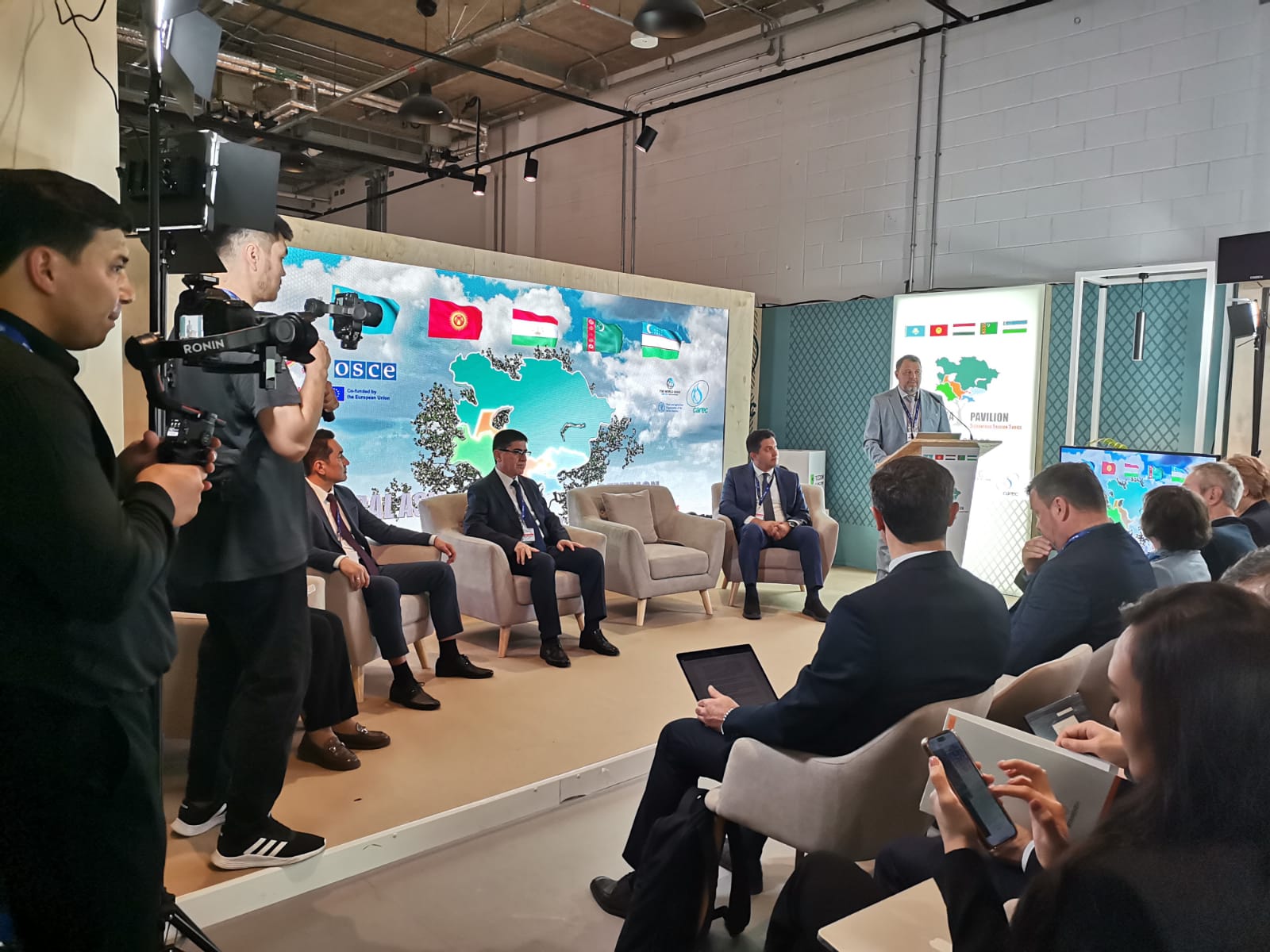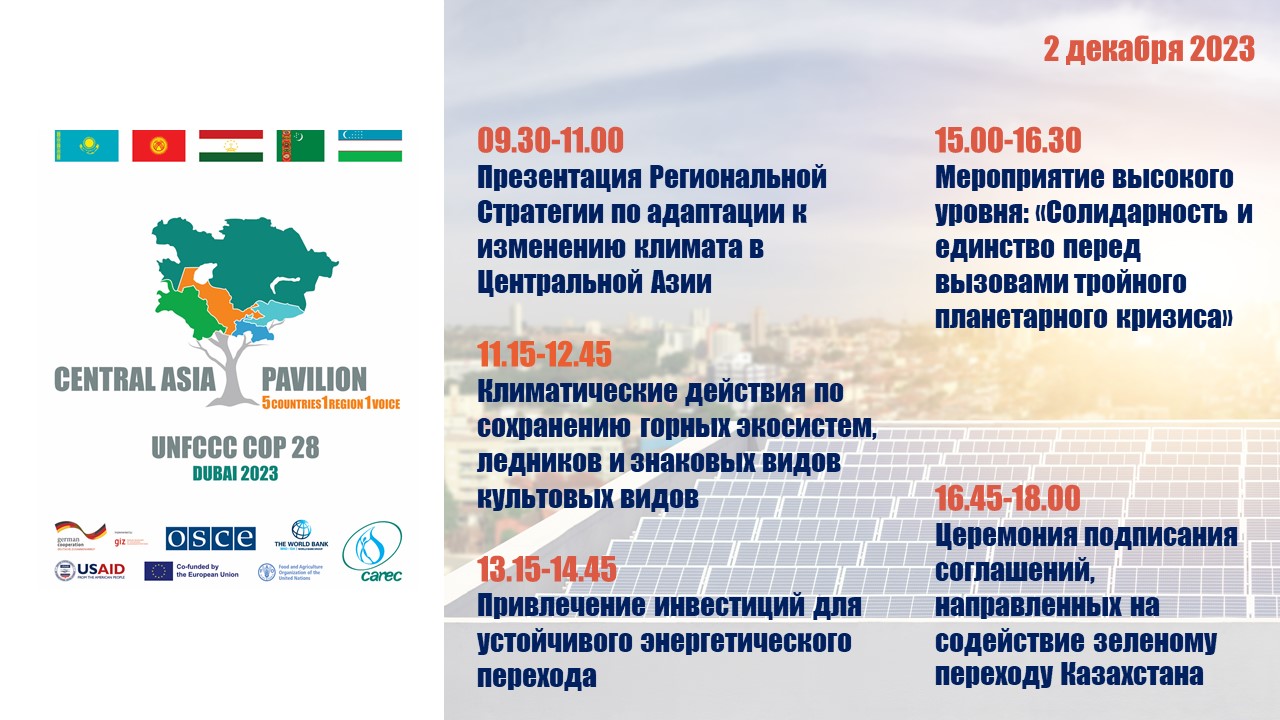Dubai, UAE – On December 1, the Central Asia Pavilion started working at the 28th Conference of the Parties to the UNFCCC (UNFCCC COP28).

The CA Pavilion brought together representatives of Central Asian countries, civil society, and development partners. Olga Pilifosova, a representative of the Secretariat of the United Nations Framework Convention on Climate Change (UNFCCC), stressed that at the plenary meeting of the 28th Conference of the Parties to the UNFCCC (UNFCCC COP28), countries adopted a highly significant document - a decision to establish a fund to cover damage from natural disasters related to climate change. Making such an important decision has demonstrated that the world countries can come to a solution to common climate change issues, and this work is important for countries with common borders and challenges before climate change.
As noted, the uniqueness of the Conference of the Parties in Dubai is that it will be the first to conduct a global assessment of the mechanism of the Paris Agreement to achieve the stated goals.
At the end of her speech, Olga Pilifosova emphasized the work of CAREC in uniting the countries of the Central Asian region and wished success in achieving concrete results on adaptation to climate change.
Torsten Brezina, Regional Coordinator of GIZ Programs, noted that cross-border cooperation between the countries of the region will make it possible to meet the modern challenges of climate change. In his opinion, the topics of water and glaciers are extremely important and should be voiced at COP28 of the UNFCCC. He assured that GIZ will be a reliable partner in supporting the Central Asian countries in the fight against the modern challenges of climate change.
Director of the Department of Climate Policy of the Ministry of Ecology and Natural Resources of the Republic of Kazakhstan Saule Sabiyeva emphasized the paramount importance of uniting the region in modern climatic realities.
Today, the Central Asian region is facing the negative consequences of climate change, and without joint efforts to confront climate challenges, the damage from the effects of climate change for the countries of Central Asia will amount to 1.3% of GDP per year, crop yields will decrease by 30%, and the water level in the Amudarya and Syrdarya rivers will decrease by 15% by 2050.
Director of the Climate Finance Center under the Ministry of Natural Resources, Ecology and Technical Supervision of the Kyrgyz Republic Azamat Temirkulov drew the attention of the participants to the fact that the entire world is witnessing crucial historical events.
“We live in a time when the planet's fate depends on us. It has never happened before in the history of humanity, and we need to realize our responsibility,” Azamat Temirkulov said.
He expressed high satisfaction with the fact that all five countries of the region united in solving climate problems, created a single Central Asian Pavilion, developed a single regional statement and developed a common position in the fight against climate change.
Director of the Agency for Hydrometeorology of the Committee for Environmental Protection of the Republic of Tajikistan Qurbonzoda Abdullo Habibullo said that the problem of melting glaciers, one of the main sources of fresh water in the region, can cause negative consequences and should be the focus of attention of the international community and the region.
He also noted that the regional statement on behalf of the governments of the Central Asian countries has become a good tradition and emphasizes the unity of the region in the international arena.
First Deputy Minister of Ecology, Environmental Protection and Climate Change of the Republic of Uzbekistan Obidjon Kudratov stressed that the problems of climate change, water resources, flora and fauna of the region are interconnected and united into one ecosystem of the region.
He said that Uzbekistan is in favor of cooperation in the region on climate change issues and expressed commitment to continue joint work on projects and programs for the benefit of the region.
Svetlana Mogilyuk, Regional Coordinator of the Civil Society Climate Network of Central Asia, congratulated CAREC on the success of organizing the Central Asian Pavilion for the second time at the Conference of the Parties to the UNFCCC, which countries perceive as a second home.
According to her, civil society expects breakthrough steps in the fight against climate change, so that people have the opportunity to maintain a decent lifestyle in modern realities. Civil society, together with the youth of Central Asia, has developed a regional statement, which will be announced on December 4 at the Tenth Meeting of Representatives of the Ministry of Foreign Affairs and Parliamentarians of the Central Asian countries in the Central Asian Pavilion.
CAREC Executive Director Zafar Makhmudov expressed his gratitude to donors and the countries of the region for their strategic and financial support in organizing the Central Asian Pavilion. He noted that the countries of Central Asia make a great contribution to reducing greenhouse gas emissions and assured that CAREC will continue to assist countries in achieving the main climate goal - to adapt and mitigate the effects of climate change at the regional level.
CAREC Executive Director Zafar Makhmudov read out the text of the regional statement prepared by the governments of the Central Asian countries for COP28 of the UNFCCC.
According to the statement, more than 75 million Central Asians are already experiencing the devastating effects of climate change, including rising temperatures, more extreme weather events and water shortages. These impacts have a significant impact on our societies, economies, the most vulnerable communities and ecosystems.
“Despite the existing challenges, we are committed to taking joint measures to combat climate change. All Central Asian countries have already presented their updated NDCs, adopted ambitious national climate goals, and are implementing a range of strategies and measures to reduce greenhouse gas emissions, adapt to the effects of climate change, and build a more sustainable future. However, the Global Synthesis Report shows that more sustained support is needed to realize our climate ambitions and achieve global goals,” the statement said.
Countries in the region are calling on the international community to support efforts to address climate change in the form of access to finance, technology and expertise that will help us achieve our climate goals.
The text of the regional statement will be available after the final approval procedure.

At the end of the opening ceremony, all participants expressed their gratitude to CAREC, international and national partners.
Central Asia Pavilion “5 countries – 1 region – 1 voice” is organized by the Regional Environmental Centre for Central Asia (CAREC) in cooperation with the Governments of Central Asian countries under financial support of the GIZ, OSCE, the World Bank, USAID, the European Union, and the Food and Agriculture Organization of the United Nations (FAO).
What is expected in the CA Pavilion on December 2?

Zhanna Husainova
Link to registration in events on December 2 - https:/us06web.zoom.us/meeting/register/tZMufu-grj4iE9DuazEHkwqeS0NI1ZCUMbZ#/registration
Link to the program of the CA Pavilion - https://carececo.org/en/main/activity/mettings/cop28/?agenda
